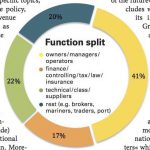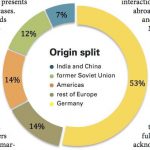Considering the experiences gained throughout the first years, the structure of the MBA-Shipping Programme of the Hamburg School of Business Administration (HSBA) has now been moderately revised and the content substantially refocused
HSBA launched the MBA-Shipping Programme in late 2011. The idea behind the initiative was to offer the German market[ds_preview] an executive MBA Programme that would fully focus on the needs of middle to upper level professionals of the industry. The Programme would thus offer seminars and networking possibilities locally and abroad and it would streamline all efforts toward the key question of business development. There was no intention of imitating or replicating existing offers and programmes of other universities, nor of attracting young graduates without substantial business experience. Instead, the target was to genuinely concentrate on the application of theory and on the business practice while at the same time rationally scrutinizing the identified challenges for the industry from an entrepreneurial point of view.
Since its start in 2011, the MBA Shipping Programme has attracted five cohorts totaling about 60 students; almost half of them have an international background. As foreseen, the Programme has attracted students from all segments of the maritime industry and related sectors, aged between 30 and 40 years.
After almost 2,000 contact hours, seven weeks in Piraeus, five weeks in Dubai and almost 270 visits to companies and related organizations, time for an update and for fine-tuning the content of the Programme’s modules had arrived. Changes made go hand in hand with recent developments in the industry as well as with the increased visibility of the Programme in the global market.
Considering the experiences gained throughout the years, the structure of the modules has been moderately revised and the content substantially refocused. Each module consists of several sub-modules concentrating on specific subjects. These sub-modules expand in blocks of 8, 16, and 24 hours; these blocks are also offered as executive training sessions for external guests who wish to gain or update their knowledge of a specific topic. Following the successful delivery of the past years, the aim is to offer these sub-modules as a compelling and balanced mix of theory and practice, inviting also experts from the industry and renowned academics. The MBA Shipping Programme consists of seven modules and concludes with the successful submission of a Thesis. All modules include topics that are relevant to the industry and they prepare the students for future challenges.
To give some examples, the module »Management and Finance« offers an interesting blend of theory and applications, as it comprises sub-modules on the optimization of networks, game theory, finance and managerial accounting as well as strategy. Network optimization offers the solid basis for the analysis of intermodal chains and of liner services with related examples and applications zooming in on hub-and-spoke services, handling of empty units, the cost of greening and even on project management and workflow improvement. The application of game theory in strategic decisions, competition analysis and negotiations is considered indispensable in modern business practice, therefore leading business schools consistently offer relevant seminars. Network optimization and game theory could both be of great interest to professionals engaged in intermodal as well as liner business and operations. The sub-modules strategy and finance and managerial accounting address educational needs, existent in almost all professional areas. Both sub-modules aim at providing participants with an insight into the respective, updated theory along with examples, illustrations and precedents from the maritime industry.
The module »Maritime Business« includes industry specific topics, such as maritime policy, chartering and revenue planning as well as international trade and commodities. The rationale behind this module is the thorough understanding of global trade (demand side) vis-à-vis the practice in the maritime industry (supply side) given the international regulatory pattern. Moreover, the sub-module maritime policy intends to further explain the impact of regulation as a drive for change. This module also includes company visits in Hamburg, which aim at familiarizing participants with our local market and highlight our professional knowledge and competitive advantages.
The module »Maritime Law and Insurance« handles the topics admiralty law, law of carriage of goods by sea and marine insurance, and it concludes with a seminar on corporate structures and taxation. The goal of this module is to educate participants on the fundamental principles and the application of English Law as well as to assist our graduates to improve their communication and exchange of information with their legal advisors. In a few words, the aim of the module is not to train »lawyers«, which would be an impossible goal considering the background of our student-groups and the limitations of the course, but to educate managers on risk management and claim handling as well as on conveying the right information to legal experts and improving risk assessment for the set up of businesses and operations.
The module »Maritime Economics and Management« aims at reviewing and restating the fundamental theory behind tramp and liner shipping as well as at give an update of these segments’ trends. A sub-module devoted on newbuilding contracts and S&P explains the fundamental terms of asset play and its practical implications; this offers also a bridge from the »economics« to the »management« fields. A pure managerial sub-module is the one focusing on quality systems, where procedures, KPIs, vetting and relevant issues are discussed, while a seminar on »digital ship« concludes the presentation of the »needs today« with the »vision of the future«. The module concludes with company visits in Piraeus, where Greek houses, such as Tsakos Group, ALMI Tankers, Anangel, etc. and business experts offer presentations and an exchange of views with the students.
The Programme also contains a module on the »International Business Clusters« which includes a one-week visit to London and another week’s visit to Dubai. The aim of this module is to familiarize the group with important business clusters by scheduling visits at leading firms and organizations such as Clarksons, Baltic Exchange, IMO, Skuld, DP World, Dubai Dry Docks, etc. Moreover, the students enjoy the unique chance of networking and clarifying business objectives and practices that cannot effectively be communicated in a classroom. All in all, it is also an opportunity to familiarize and get acquainted with different business mentalities and cultural backgrounds and to enhance ones soft skills.
The module »Ship Finance« summarizes essential knowledge on conventional bank loan and debt, clarifies issues related to private equity, derivatives and valuation and finally presents many relevant cases. This module builds upon knowledge gained in the relevant sub-modules corporate finance, newbuilding contracts, second-hand purchase of ships and law and exemplifies the problems and risks faced by lenders and borrowers in maritime projects. Along with cases dealing with conventional structures, emphasis is put on innovative schemes as well as on specialized topics, such as the impact of taxation. It is a module with a strong flavor of Hamburg and its financial markets.
The last module »Development Strategies« reviews critical issues from the previously delivered modules, such as risk management, environmental compliance and greening, and it analyses strategies and options for growth and development. Practical cases and examples are interactively analyzed and discussed in order to offer the student groups a view from both sides of the fence and provide them with a competitive and collaborative approach.
By choosing a topic for their thesis, students explore a specific scientific area and address a problem of their interest. This problem might be of professional or academic nature. Indicatively, students in the past have dealt with typical business problems, such as the improvement of operational decision-making as well as with pure theoretical conundrums, such as the mathematics of network optimization. Needless to say, students are encouraged to select topics related to innovation and business development and to choose subjects that potentially can be further elaborated and finally published. Every publication increases the visibility of our graduates and of our university. It communicates interesting information to relevant business players and establishes trust in our work.
All the above changes aim at improving the delivered academic quality of the MBA Shipping Programme, yet at the same time indirectly serve the goals of the Hamburg maritime cluster. The brand name of our cluster is strengthened through the enrollment of foreign students and the interaction with companies abroad that host visits and workshops. The MBA Programme has become the emblematic educational offer of our cluster abroad. This outcome results from collective work of many experts and local institutions; HSBA gratefully thanks them and acknowledges their contribution.
Author: Orestis Schinas
Head of Maritime Business School
Hamburg School of Business
Administration
Orestis.schinas@hsba.de
Orestis Schinas





















